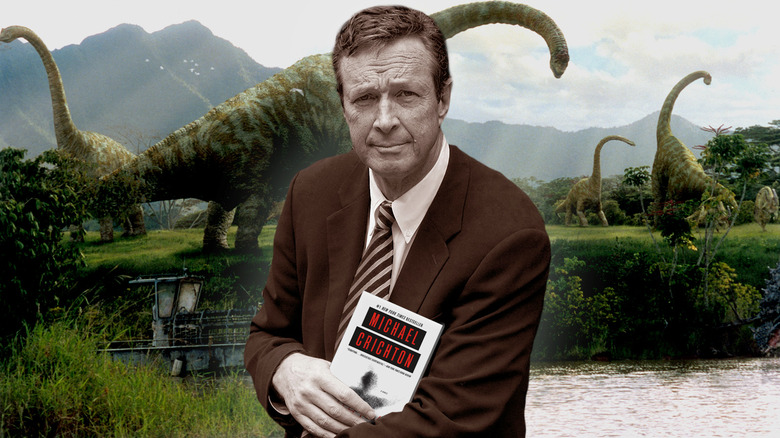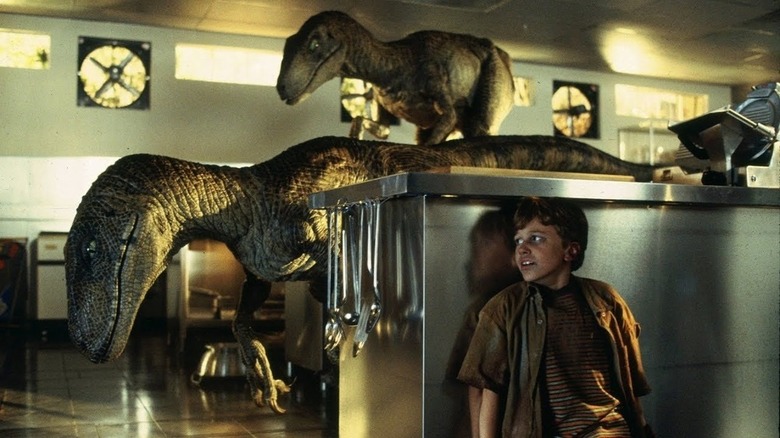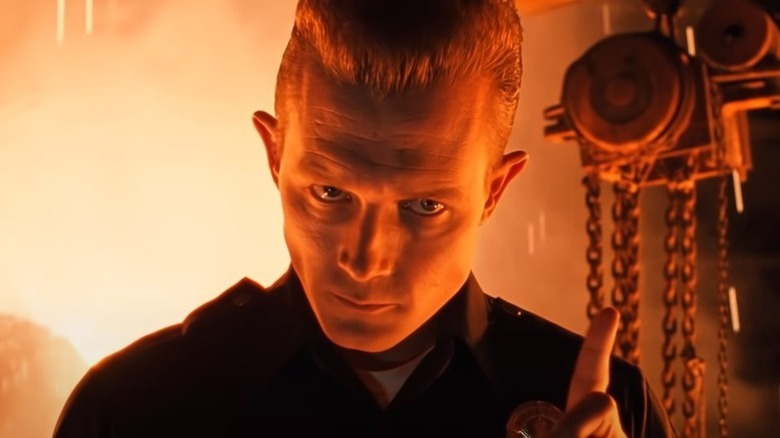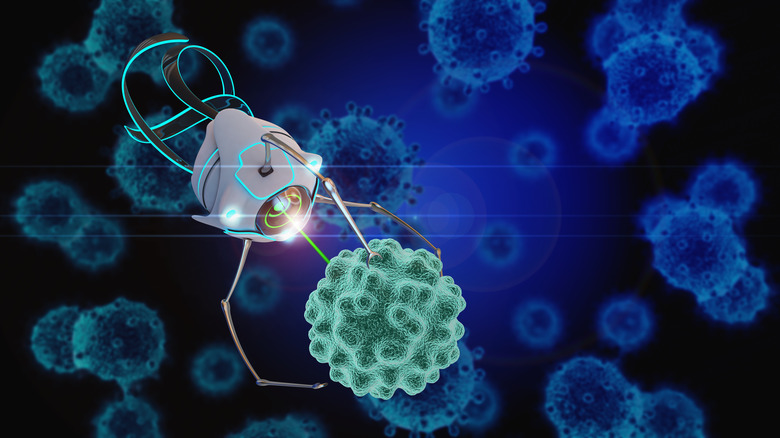Forget Jurassic Park - Michael Crichton's Best Book Is Still Begging For A Film Adaptation
The age of the dinosaurs has come to an end, and not just because of a certain asteroid 66 million years ago. Their pop culture prominence is also on the wane, thanks to the fact that the "Jurassic Park/World" double trilogy has finally reached its conclusion. Until someone inevitably jumpstarts a new "Jurassic Galaxy" trilogy, dinosaurs are now stuck in the kind of rut where the trailer for "Meg 2: The Trench" feels confident enough to show its megalodon monster casually munching on a T. rex.
This leaves the legacy of "Jurassic Park" author Michael Crichton in a strange and uncharacteristic place. The original "Jurassic Park" trilogy is famously (if somewhat loosely) based on his work, and while the "Jurassic World" movies are decidedly closer to "based on characters created by" territory, their prominence still kept his name in the big-budget tentpole movie zeitgeist. While it's hard to feel sorry for an author whose work spawned one of the biggest, most beloved blockbuster hits out there, it still seems somewhat unfair that Crichton's name is so closely associated with dinosaur cloning-induced disasters. After all, the writer — who passed away in 2008 — was extremely prolific, and many of his works have been adapted to the big screen. From "The Andromeda Strain" to "Congo" and "Sphere," the world has no shortage of non-dinosaur-themed Crichton film adaptations. Yet somehow, Hollywood has been sleeping on the author's most movie-worthy book, "Prey." Here's why a film adaptation of the novel could blow "Jurassic Park" out of the water.
Fair warning: To fully describe why "Prey" would make a great movie, we need to discuss its central plot points a bit, so spoilers for the book ahead.
Prey could combine the best things about the best sci-fi thrillers
"Prey" mixes its "Jurassic Park"-style "science gone wrong" sci-fi thriller tale with a healthy dose of horror. The story centers on a programmer called Jack, whose wife, Julia, is a VP of a major nanotech company. After Jack witnesses a series of sinister scenarios in his home and Julia's behavior becomes stranger, he becomes increasingly entwined with the company, as well. It turns out that the company has serious trouble trying to control its nanobot swarms.
The swarms promptly pull a "Jurassic Park," and what began as a mystery regarding what exactly is going on soon gives way to a series of revelations of what these nanobot hordes are capable of. Crichton's exploration of the great many ways an intelligent swarm of tiny, hostile things can wreck a person is as imaginative and cinematic as it is utterly horrifying. As Jack and the company's programmers try to figure out a way to stop the nanobots, the plot alternates between tense "Jurassic Park"-style hiding scenes to very "Alien"-style horror and even the "deadly doppelgänger in an isolated facility" antics of John Carpenter's "The Thing." There are elements of virtually every sci-fi thriller worth its salt in "Prey," as well as several cool and gory twists that would be guaranteed to drop some jaws to the sticky theater floor.
The nanobot swarms are every movie monster rolled into one
"A swarm of tiny things" might sound like the most boring movie monster in existence, but the grim inventiveness of the nanobot swarms raises them far above and beyond your average smoke monster or mysterious fog. "Prey's" swarms are extremely resourceful and come in many forms. In one scene, a swarm might attack as a lethal cloud that asphyxiates its victims. In another, they're shapeless monstrosities stalking the building the humans are hiding in. In yet another, they channel a combination of "The Thing" and T-1000 (Robert Patrick) with a shapeshifting trick that leaves both famous villains in the dust. The swarms, you see, can change shape and impersonate people just fine ... only they do it by covering the human, forming a facsimile shell around them, and slowly eating the person trapped within for energy while controlling them like a meat puppet.
You can see the cinematic potential this kind of prolific offense provides. The nanobot swarms excel in multiple classic movie monster tropes, and can transition between them in mere moments, providing new, nasty shocks and exciting plot developments at every turn. What's more, they even have a few key vulnerabilities that can temporarily neutralize their threat, which is always important in order to give puny humans a fighting chance ... or at least a few extra seconds to run.
Prey could be a summer blockbuster for the ages ... or a seminal sci-fi horror film
The most recent news of a potential "Prey" movie is unfortunately fairly old, as the book's film rights have been sitting with 20th Century Studios since 1997 (per Variety). Still, in this age of constant adaptations of existing intellectual property, it wouldn't be a huge surprise to receive news about the subject at some point in the not-too-distant future ... although it's pretty hard not to smile at one studio representative's comments about the adaptation. "Our instinct is to do this quickly," they said at the time. Again, this was in 1997.
Still, there's always hope, because "Prey" has ample big-screen potential. Perhaps the greatest thing about it is that the film version of the novel could be whatever you want it to be, really. Its "Jurassic Park"-style big beats would lend themselves extremely well to the classic blockbuster format, and with the right approach, the nanobot swarms could be a visual feast that could rival all the classic special effects groundbreakers — think a new "Avatar," or "Terminator 2: Judgment Day," or obviously "Jurassic Park." However, the more sinister elements of the plot would lend themselves extremely well to a full-on horror approach, too. We've already mentioned "The Thing" and "Alien," but really, the sky's the limit. There's no reason why "Prey" couldn't become a prestige A24 horror film fans will remember fondly whenever it's 3am and they can't sleep (possibly because they just re-watched it for the 12th time). Of course, seeing as "Jurassic Park" also flirts with horror tactics, "Prey" could take a similar route, and just embrace all of its tense weirdness as a big-budget production that isn't afraid to creep you out.
Regardless of the approach that the film adaptation might end up choosing, it's clear that a "Prey" movie would be extremely entertaining, and done right, it'd have a pretty good fighting chance to knock "Jurassic Park" off the "best Michael Crichton movie adaptation" throne. Of course, they'd probably have to change the title, because we already have one sci-fi "Prey" that rules.



